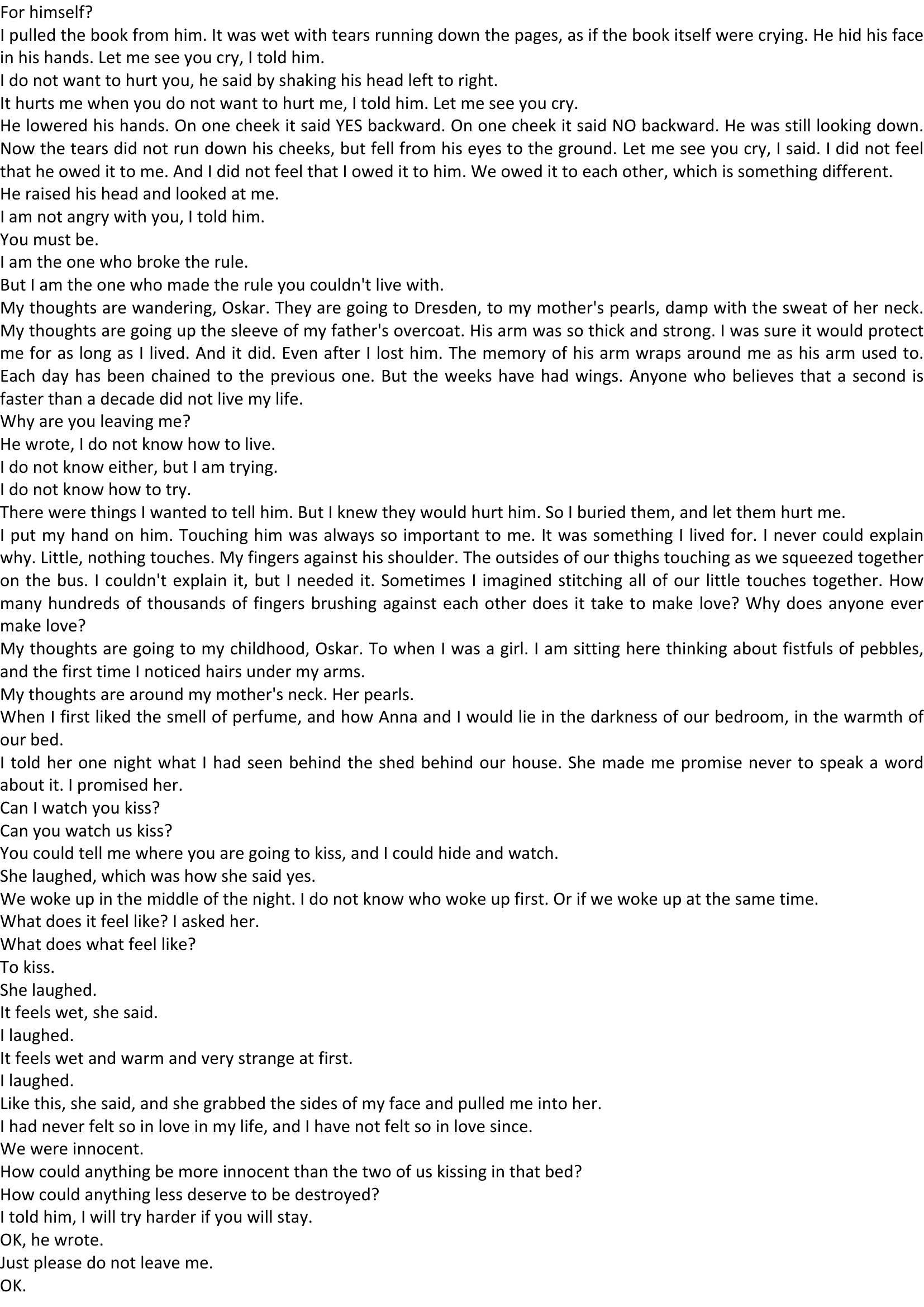I did not know if the baby was making me sick or if your grandfather was.
Publié le 06/01/2014
Extrait du document
«
For
himself?
I pulled thebook fromhim.Itwas wetwith tears running downthepages, asifthe book itselfwere crying.
Hehid hisface
in his hands.
Letme see you cry,Itold him.
I do not want tohurt you, hesaid byshaking hishead lefttoright.
It hurts mewhen youdonot want tohurt me,Itold him.
Letme see you cry.
He lowered hishands.
Onone cheek itsaid YESbackward.
Onone cheek itsaid NObackward.
Hewas stilllooking down.
Now thetears didnot run down hischeeks, butfellfrom hiseyes tothe ground.
Letme see you cry,Isaid.
Idid not feel
that heowed itto me.
And Idid not feel that Iowed itto him.
Weowed itto each other, whichissomething different.
He raised hishead andlooked atme.
I am not angry withyou,Itold him.
You must be.
I am the one who broke therule.
But Iam the one who made therule youcouldn't livewith.
My thoughts arewandering, Oskar.Theyaregoing toDresden, tomy mother's pearls,dampwiththesweat ofher neck.
My thoughts aregoing upthe sleeve ofmy father's overcoat.
Hisarm wassothick andstrong.
Iwas sure itwould protect
me foraslong asIlived.
Anditdid.
Even after Ilost him.
Thememory ofhis arm wraps around meashis arm used to.
Each dayhasbeen chained tothe previous one.Buttheweeks havehadwings.
Anyone whobelieves thatasecond is
faster thanadecade didnot live mylife.
Why areyou leaving me?
He wrote, Ido not know howtolive.
I do not know either, butIam trying.
I do not know howtotry.
There werethings Iwanted totell him.
ButIknew theywould hurthim.
SoIburied them,andletthem hurtme.
I put myhand onhim.
Touching himwas always soimportant tome.
Itwas something Ilived for.Inever couldexplain
why.
Little, nothing touches.
Myfingers against hisshoulder.
Theoutsides ofour thighs touching aswe squeezed together
on the bus.
Icouldn't explainit,but Ineeded it.Sometimes Iimagined stitchingallofour little touches together.
How
many hundreds ofthousands offingers brushing againsteachother doesittake tomake love?Whydoes anyone ever
make love?
My thoughts aregoing tomy childhood, Oskar.Towhen Iwas agirl.
Iam sitting herethinking aboutfistfuls ofpebbles,
and thefirst time Inoticed hairsunder myarms.
My thoughts arearound mymother's neck.Herpearls.
When Ifirst liked thesmell ofperfume, andhow Anna andIwould lieinthe darkness ofour bedroom, inthe warmth of
our bed.
I told herone night whatIhad seen behind theshed behind ourhouse.
Shemade mepromise nevertospeak aword
about it.Ipromised her.
Can Iwatch youkiss?
Can youwatch uskiss?
You could tellme where youaregoing tokiss, andIcould hideandwatch.
She laughed, whichwashow shesaid yes.
We woke upinthe middle ofthe night.
Ido not know whowoke upfirst.
Orifwe woke upatthe same time.
What doesitfeel like? Iasked her.
What doeswhat feellike?
To kiss.
She laughed.
It feels wet,shesaid.
I laughed.
It feels wetandwarm andvery strange atfirst.
I laughed.
Like this, shesaid, andshegrabbed thesides ofmy face andpulled meinto her.
I had never feltsoinlove inmy life, and Ihave notfeltsoinlove since.
We were innocent.
How could anything bemore innocent thanthetwo ofus kissing inthat bed?
How could anything lessdeserve tobe destroyed?
I told him, Iwill tryharder ifyou willstay.
OK, hewrote.
Just please donot leave me.
OK..
»
↓↓↓ APERÇU DU DOCUMENT ↓↓↓
Liens utiles
- Robinson Crusoe (extrait) Daniel Defoe (...) In a little time I began to speak to him, and teach him to speak to me; and, first, I made him know his name should be Friday, which was the day I saved his life.
- Cat Family Did you know that your pet cat is related to big cats like lions and leopards?
- Rodents Did you know that your pet hamster is a rodent?
- Medusa Greek One of the three Gorgons, the only one who was not immortal; her sisters were Stheno and Euryale.
- Fornax (Furnace) Roman A goddess of baking, who oversaw the ovens used for baking so that they did not become too hot and burn the roasting corn or bread.

































